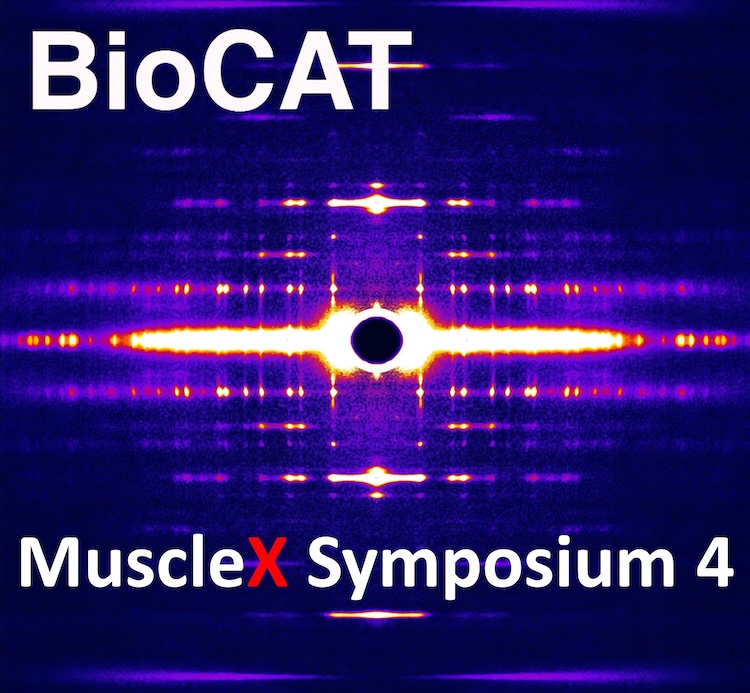We are pleased to announce the fourth BioCAT MuscleX symposium. The Biophysics Collaborative Access Team (BioCAT), funded by the National Institutes of Health (NIH), operates state-of-the-art X-ray facilities for studying the structure and dynamics of biological systems under non-crystalline conditions, resembling their functional states in living tissues. The symposium will feature an introductory presentation on BioCAT’s scientific missions, new capabilities enabled by recent upgrades to the APS source and to the BioCAT beamline, and a series of talks highlighting recent muscle studies utilizing X-ray diffraction or other structural techniques.
The workshop will take place from 5/15/2025 to 5/16/2025 and will be entirely virtual (via Zoom https://iit-edu.zoom.us/meeting/register/tup-TPN-RS2g_pqBKHSQ5w).

Registration
All participants this year will attend remotely. There is no cost associated with the symposium, but registration is required for administrative purposes.
Registration at: https://forms.office.com/r/ff7cbnNYgy
More information
Symposium topics:
- Introduction to the scientific mission at BioCAT
- Scientific presentations from recent muscle studies using x-ray diffraction and/or other structural techniques.
If you have questions, please contact Maicon Landim Vieira (mlandimvieira@illinoistech.edu) or Weikang Ma (wma6@illinoistech.edu).
Confirmed speakers (Alphabetically):
- Alice Arcidiacono (King’s College London, UK)
- Anthony Hessel (University of Muenster, Germany)
- Cameron Hill (King’s College London, UK)
- Christopher McAllister (University of Pennsylvania, USA)
- Ilaria Morotti (University of Florence, Italy)
- Julien Ochala (University of Copenhagen, Denmark)
- Kristi Kooiker (University of Washington, USA)
- Leonardo Sacconi (Institute of Clinical Physiology-CNR, Italy)
- Maicon Landim Vieira (Illinois Institute of Technology, USA)
- Michael Regnier (University of Washington, USA)
- Natalia Koubassova (Moscow University, Russia)
- Roger Craig (UMass Chan Medical School, USA)
- Thomas Irving (BioCAT, Illinois Institute of Technology, USA)
- Vincenzo Lombardi (University of Florence, Italy)
- Vivek Jani (Johns Hopkins University, USA)
- Weikang Ma (BioCAT, Illinois Institute of Technology, USA)
Tentative schedule
Note: All times are Central Daylight Time (UTC-5)
Tuesday 5/15/25
| 09:30 am | Welcome - Tom Irving |
| 09:45 am | Introduction to scientific programs at BioCAT - Weikang Ma |
| . | Thick filament structure and regulation |
| 10:00 am | Muscle myosin dynamics in hibernation - Julien Ochala |
| 10:40 am | Annotating the X-ray diffraction pattern of vertebrate striated muscle - Roger Craig and Natalia Koubassova |
| 11:20 am | Cardiac performance and hierarchical activation of thick filament - Ilaria Morotti |
| 12:00 pm | Break |
| 12:30 pm | X-ray diffraction and other biophysical approaches to study myosin OFF and ON states - Michael Regnier |
| 01:10 pm | Regulation of contraction of slow-twitch skeletal muscle - Cameron Hill |
| 01:50 pm | Molecular basis of length-dependent activation (LDA) in cardiac muscle - Alice Arcidiacono |
| 02:30 pm | Breakout Sessions for Discussion |
Friday 5/16/25
| . | Translational Studies in Muscle Research |
| 09:30 am | Probing relaxed myosin states in hypertrophic cardiomyopathy by second harmonic-generation microscopy - Leonardo Sacconi |
| 10:10 am | Implications of Obesity on Myofilament Function in Heart Failure with Preserved Ejection Fraction - Vivek Jani |
| 10:50 am | Investigating the structural effects HCM causing variants on the cardiac sarcomere - Christopher McAllister |
| 11:30 am | Desmoglein-2 deficiency results in cardiac dysfunction by compromising both Z-disc- and intercalated disc-mediated mechanotransduction - Maicon Landim-Vieira |
| 12:10 pm | Break |
| 12:40 pm | Regulation of the structure-function relationship by small molecule myosin modulators in porcine cardiac muscle - Kristi Kooiker |
| . | Titin and MyBP-C |
| 01:20 pm | Switching ON of titin in relation to dual filament activation in skeletal muscle - Vincenzo Lombardi |
| 02:00 pm | Exploring the role of titin and MyBP-C in skeletal and cardiac muscle - Anthony Hessel |
| 02:30 pm | Breakout Sessions for Discussion |